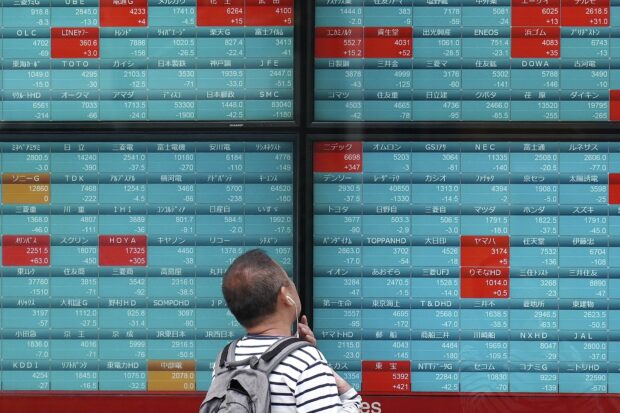
A person looks at an electronic stock board showing Japan’s Nikkei 225 index at a securities firm in Tokyo, on April 16, 2024. (AP Photo/Eugene Hoshiko, File)
Asian shares were mostly higher on Monday after Wall Street ended last week with the stock market’s best day in over two months in a rally backed by the cooler-than-expected U.S. employment data.
U.S. futures edged higher and oil prices rose.
The Japanese yen weakened slightly after its value swung from a low of 160.25 to the U.S. dollar to 151.86 late last week following suspected government intervention. The dollar bought 153.93 yen, up from 152.90 yen.
Japanese Finance Minister Shunichi Suzuki told a gathering at the Asian Development Bank’s annual meeting Friday, held in Tiblisi, Georgia, that rapid fluctuations were hurting households and businesses.
The euro rose to $1.0765 from $1.0763.
The Hang Seng in Hong Kong lost 0.2 percent to 18,447.12 while the Shanghai Composite index rose 0.9 percent to 3,133.92 as markets reopened after a weeklong holiday. A private sector survey Monday showed the country’s services sector grew at a slower pace in April due to rising costs although new orders rose and business sentiment improved.
Australia’s S&P/ASX 200 rose 0.5 percent to 7,669.50. Taiwan’s Taiex gained 1.2 percent.
Japan and South Korea’s markets were closed for the holidays.
Cooling labor market
On Friday, the S&P 500 rose 1.3 percent to 5,127.79, its best day since late February. The benchmark index also erased its losses for the week.
READ: Stocks gain while dollar retreats as US labor market cools
The Dow Jones Industrial Average rose 1.2 percent to 38,675.68. The Nasdaq composite ended 2 percent higher and closed at 16,156.33, reflecting strong gains by technology sector stocks, which accounted for much of the rally.
The nation’s employers added 175,000 jobs last month, down sharply from the blockbuster increase of 315,000 in March, according to the Labor Department. The latest hiring tally came in well below the 233,000 gain that economists had predicted. Meanwhile, average hourly earnings, a key driver of inflation, rose less than expected.
The modest increase in hiring last month suggests the Federal Reserve’s aggressive streak of rate hikes may be finally starting to take a bigger toll on the world’s largest economy. That may help reassure the Fed that inflation will ease further, which could move the central bank closer to lowering interest rates.
Widespread rally
Friday’s market rally was widespread, though technology stocks powered much of the gains. Apple jumped 6 percent after announcing a mammoth $110-billion stock buyback. The tech giant reported late Thursday its steepest quarterly decline in iPhone sales since the outset of the pandemic.
Microsoft rose 2.2 percent and Nvidia added 3.5 percent.
Several companies notched gains after reporting strong quarterly results.
READ: Nvidia replaces Alphabet as Wall St’s third most valuable company
Amgen climbed 11.8 percent after the biotechnology company gave investors an encouraging update on a potential obesity drug. Live Nation Entertainment added 7.2 percent after the ticket seller and concert promoter beat analysts’ first-quarter revenue forecasts.
Motorola Solutions closed 5.2 percent higher after the communications equipment maker raised its profit forecast for the year.
Booking Holdings rose 3 percent after reporting better-than-expected first-quarter bookings and revenue. Another online travel company, Expedia Group, didn’t fare as well, despite its latest quarterly results beating Wall Street targets. Its shares slumped 15.3 percent, the biggest decline among S&P 500 stocks after it lowered its full-year bookings guidance because its Vrbo rental unit has been slow to recover from its migration to Expedia’s platform.
In energy trading, benchmark U.S. crude rose 23 cents to $78.34 a barrel in electronic trading on the New York Mercantile Exchange. Brent crude, the international standard, climbed 18 cents to $83.14 a barrel.